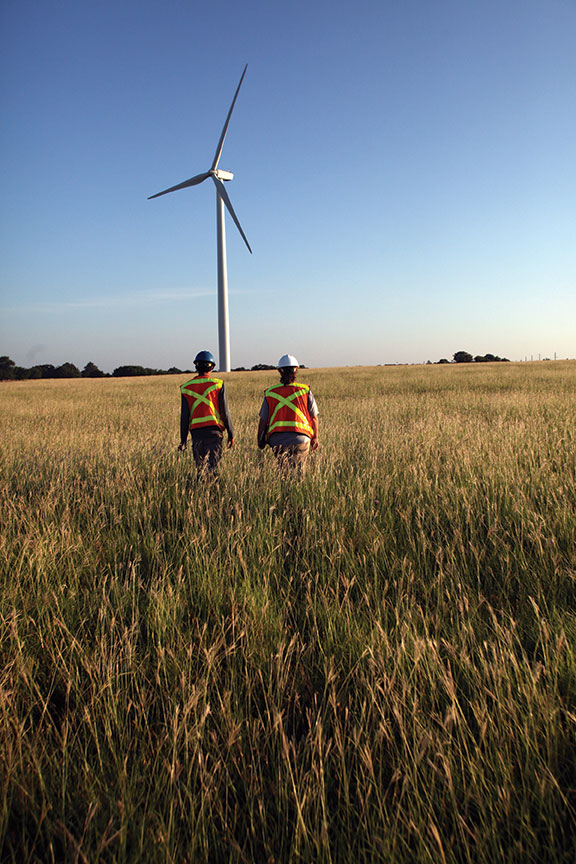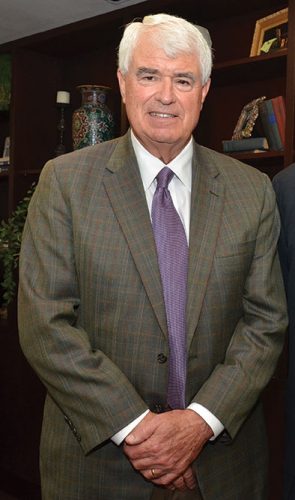Is a National Energy Policy a Good Idea?
Faculty experts offer a range of opinions.

Energy is TCU's Great Theme for 2016. (Photo by Carolyn Cruz.)
Is a National Energy Policy a Good Idea?
Faculty experts offer a range of opinions.
Ken Morgan, director of the TCU Energy Institute and professor of geology

A North American energy policy or alliance is crucial to planning for the future. After 100 years of energy production, this is our last decade to get it right, or not. We are at a tipping point.
What would a North American energy policy or alliance look like?
- We need Canada, the U.S. and Mexico to form a powerful and strategic energy alliance.
- We need coordination of energy production from all three countries. Each has energy strengths and weaknesses. For example, Canada has vast heavy or “sour” crude resources but no refineries. The U.S. has light or “sweet” crude and refineries. Mexico has offshore resources and potential for onshore development.
- We must develop new energy markets for natural gas in North America: We are the Saudi Arabia of natural gas. We need to open up new exporting facilities and new investment opportunities for North American natural gas. We must open up new energy investments in Mexico for producing, transporting, exporting, developing markets and creating trade innovations.
- We must invest in energy infrastructure across the borders. A potential disaster is brewing because, after its recent election, Canada is backing away from traditional energy in favor of unsustainable green efforts.
- We must educate our TCU students about all of these energy issues and make it our mission to create “North American energy independence by 2025.” We can be the greatest exporter on the planet. There is nothing to export with wind and solar energy, and other renewables, which are inefficient and currently make up less than 10 percent of our energy resources. Developing countries will chose coal, which is a very harmful energy source, unless we deliver to them a better choice.
Nowell Donovan, provost and professor of geology

In 2011, a United Nations report suggested that by 2030, a world population of some 8.3 billion souls would require approximately 30 percent more potable water, about 49.5 percent more energy and roughly 50 percent more food. These are sobering figures in a world marked by fading moral boundaries and an exponentially increasing capacity for self-destruction.
Viewed against this background, the need for an energy policy would seem to emerge with all the gravitas of a biblical commandment. However, the siren call must be tempered by realities that require any such policy to be flexible enough to realize that one size cannot fit all. Energy is difficult to export even in its easiest form – electricity. Potential sources of energy on this planet are not distributed according to the dictates of national boundaries. Populations are frequently distant to the energy they require. Some energy sources are secure, tried and tested; others are developmentally in their infancy and dependent on subsidy; others are but pipe dreams. The vagaries are vast. In my opinion, each of the political entities dividing us needs to develop an energy portfolio that looks at present needs and projects strategically into the future.
“Energy” has assumed a mantle of quasi-religious fervor that can inhibit rational thought. This secular mysticism, derived from classic environmentalism and, equally, from uninhibited capitalism, inhibits the development of rational solutions. Only when we allow our capacity for reason to best irrational emotion will we develop the solutions essential to our survival.
Specifically, the United States needs to develop regional solutions that integrate realistic and cost-effective measures, balancing current availability of supply, the need to develop future sources (requiring research), environmental sensitivity, geographic reality, and a demand that will continue to increase. The most difficult part of any energy policy in the country will be balancing the role of private companies and governmental agencies.
Manochehr Dorraj, professor of political science
 In the past, U.S. energy policy has been for the most part reactive, ad-hoc, driven by response to crisis, and at times, it has been incoherent. In an increasingly interdependent and integrated global energy market, we need an energy policy that not only coordinates production, distribution and consumption of energy at local and national levels but also coordinates such activities internationally.
In the past, U.S. energy policy has been for the most part reactive, ad-hoc, driven by response to crisis, and at times, it has been incoherent. In an increasingly interdependent and integrated global energy market, we need an energy policy that not only coordinates production, distribution and consumption of energy at local and national levels but also coordinates such activities internationally.
We need an energy policy that strongly promotes energy efficiency and encourages production of diverse forms of energy in order to meet rising demand. In the last decade, the United States led the world in acquiring technologies that enabled it to become a major producer of natural gas and diminished the share of coal in its energy mix, thus lowering emissions of pollution. New policies must be initiated to affirm the United States’ role as a leader in producing the “clean energy” of the future.
A comprehensive energy policy also involves reconciling conflicting interests, taking into consideration the public’s input, and having an accurate understanding of cost-benefits and trade-offs involved in choosing different forms of energy supply. The 1970s energy shock should have been a wake-up call for the need to articulate a coherent energy policy, but we let that opportunity slip through our fingers. The current collapse of oil prices provides yet another opportunity to coordinate energy policy to better cope with the cycles of boom and bust in energy prices — and their economic and social consequences.
Since the U.S. is currently an exporter (natural gas) as well as an importer (oil) of energy, it is well positioned to assume a more pro-active role in the consumers-producers dialogue. It also can facilitate the dialogue between OPEC and non-OPEC producers of energy and use its influence over Saudi Arabia to curb its ill-advised manipulation of oil prices by flooding the market in order to run its competitors out of the market. Energy is too important for our economic survival to leave to the whims of the market. The time for the articulation of a comprehensive energy policy has come.
Ed Ireland, professor of professional practice in finance

Opinions vary. My position is that the United States has the best possible energy policy, which is no comprehensive federal energy policy at all. That has allowed the energy markets to operate without policy-induced market distortions. The problem with energy policies, and all policies for that matter, is that they pick winners and losers in one way or another. If there had been a comprehensive federal energy policy in place going back 35 or 40 years, which let’s say promoted wind and solar over fossil fuels, I doubt that the shale energy revolution would have ever occurred. But because energy markets have been more or less unconstrained by policies, entrepreneurs were able to refine the techniques required to get natural gas and oil out of shale rock and make the wells profitable, triggering the biggest energy boom in this country in a 100 years.
Michelle Edwards, assistant professor of sociology

Energy is a critical issue. We are likely to increase our national and global consumption of energy over the next two decades. Most scientists also argue that as we have burned more fossil fuels for electricity, heat, and transportation, we have increased our emissions of greenhouse gases, resulting in global climate change, whose effects, such as drought and severe weather, also have impacts on our energy system (U.S. Department of Energy, 2016).
While many Americans are hopeful that new technologies will solve our problems, I would remind the public that each source of energy comes with its share of social and environmental risks and consequences. Even improving energy efficiency, which seems to be an environmentally “good” step to take, has sometimes been found to increase overall energy production and use (the “Jevons paradox”).
The federal government certainly has an important role to play in thinking about our energy future, particularly as our within-country decisions impact ecosystems and societies across the globe. However, I would suggest that we also think more critically about energy policy at lower institutional levels, as they often seem to possess higher levels of public trust and may be more successful in instituting energy policy change.
Larry Brogdon, adjunct professor of geology and chair of the TCU Energy Institute’s advisory board
 I have always been a proponent of a national energy policy. However, with much thought and reflection, I have changed my mind. I do not believe with the present political environment being so polarized that a consensus can be achieved. The unintended consequences of favoring one energy resource over another could have grave economic affect with little environmental impact. We probably have never been more energy secure than we are right now. Let the marketplace determine our direction.
I have always been a proponent of a national energy policy. However, with much thought and reflection, I have changed my mind. I do not believe with the present political environment being so polarized that a consensus can be achieved. The unintended consequences of favoring one energy resource over another could have grave economic affect with little environmental impact. We probably have never been more energy secure than we are right now. Let the marketplace determine our direction.

Your comments are welcome
Comments
Related reading:
Features
Energy Institute’s Advice for Mineral Owners
Pioneering program doles out the know-how for securing successful oil and gas leases.
Campus News: Alma Matters
Faculty Roundtable on Influential People
Who is the most important person alive today? Why?